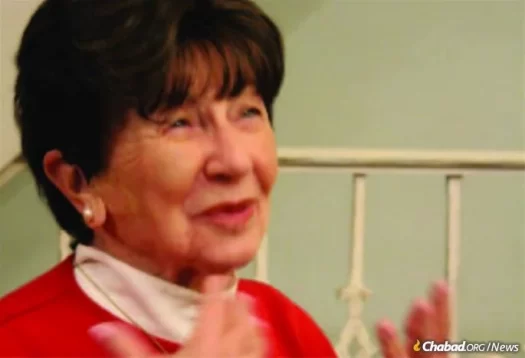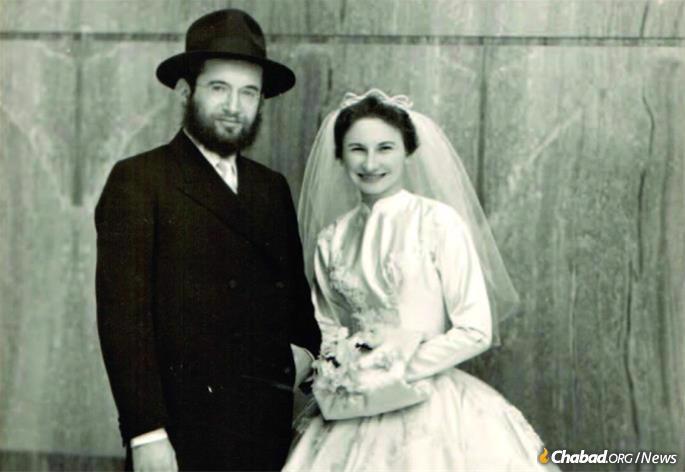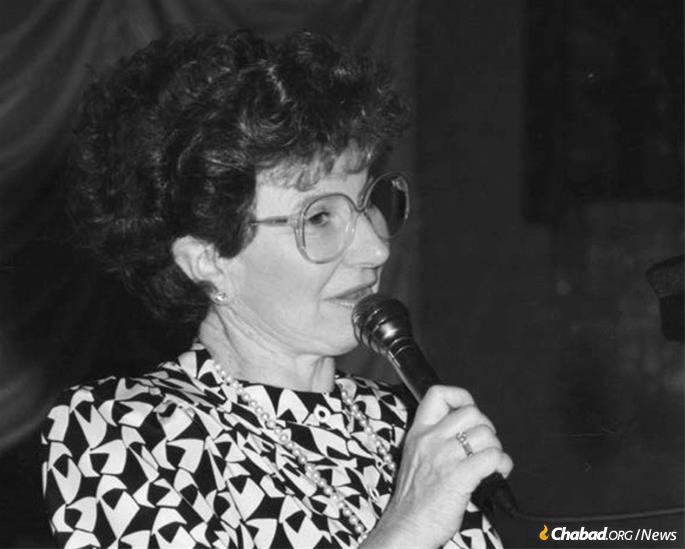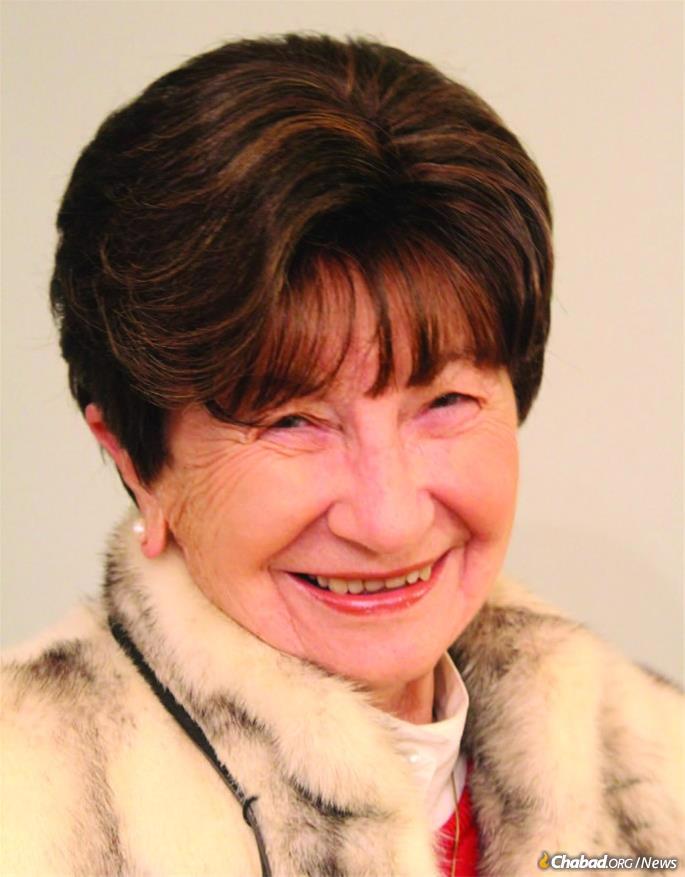
Obituary: Winnie Gourarie, 88, Blazed a Trail for South African Jewish Women
by Menachem Posner – chabad.org
Her table set with the finest crockery and silverware, laden with home-cooked delights all up to the highest standards of kosher, Winnie Gourarie created an inviting atmosphere where Torah thoughts and Chassidic melodies flowed, and spirits were uplifted and united. Winnie Gourarie, who passed away on Oct. 28 (3 Cheshvan) at the age of 88, was described as “an aristocrat of South African Jewry,” who blazed a path for others to follow.
“People from all walks of life admired and liked her,” recalls Rochel Goldman, who has lived in Johannesburg since 1976, when her husband, Rabbi Yossy Goldman, founded the country’s first Chabad House. “She gave freely of her time and talents, and people responded with appreciation and respect.”
She was born Vichna Aloy on 9 Kislev, 5695 (Nov. 16, 1934), and was named after her maternal grandmother in the town of Dokshitz (today in Belarus, but then in Poland), whose Jewish population was primarily Chabad Chassidim and where her family had deep roots.
Her father, Rabbi Yirmeyahu Aloy, was the scion of a Chabad family and a staunch Chassid. Having relocated to Vilna to eke out a few pennies as a young teen, he found his way to a yeshivah, where he soon attracted the attention of Rabbi Chaim Ozer Grodzinsky, the preeminent head of the Vilna rabbinic court, for whom he would regularly read the Torah. After studying in yeshivahs in Vilna, Mir and Lomzhe, he returned to Dokshitz, where he married Rochel Leah Rivkind, the daughter of a local Torah teacher, in 1933.
Back in Dokshitz, Rabbi Aloy served as the rosh yeshivah in the short-lived Chabad yeshivah in the nearby town of Glubokoe.
In 1937, realizing that the future of Jews in Eastern Europe was dire, Rabbi Aloy decided to immigrate to South Africa, where he had relatives. With the assistance of Rabbi Grodzinsky, he was appointed fundraiser for the Brisk Yeshivah in South Africa.
Two years later, in August of 1939, just two weeks before World War II broke out, he was joined by his wife and daughter. The boat that brought them from London, the Warwick Castle, was sunk by the Germans on its way back to England.
Four-year-old Vichna was enrolled in a local kindergarten, where her teacher dubbed her Winnie, a name that stuck.
Growing up in an era where there were no Torah day schools in South Africa, Winnie attended the “Jewish government” elementary school, which was closed on all Jewish holidays, and then a public high school. Her Jewish studies took place after school hours.
In many ways, the Aloys were trailblazers, proudly carrying the standard of fealty to Torah observance and Jewish life. In addition to being the spiritual leader of the prestigious Berea Hebrew Congregation, the rabbi threw himself into communal affairs on behalf of the entire South African Jewish community, leading the country’s beth din. “He was a master of all arts,” recalls Rabbi Koppel Bacher. “He was a meticulous organizer, a rav, and he was loved in this community.”
In a letter written in 1946, the Rebbe——Rabbi Menachem M. Schneerson, of righteous memory—encouraged Aloy to redouble his efforts noting that “there are few in your country who are capable of occupying themselves in this endeavor.”

A Teenage Leader
As a teen, Winnie joined and became a leader in the Bnei Akiva movement, then called Hashomer Hadati, which was the only religious youth movement in the country.
Following high school, she studied in teachers’ seminaries in Israel and in South Africa. After she had been teaching for a year in a town called Bloemfontein, her parents decided it was time to search for a match. Since there were virtually no young Chassidic scholars in South Africa then, she and her mother set sail to New York via London.
In New York, she had an audience with the Rebbe for the first time and began meeting prospective young men.
When she was introduced to Rabbi Sholom Ber Gourarie, originally of Tel Aviv, she was intrigued by the bearded scholar, with whom she conversed in Hebrew, but he had his doubts. Would a girl educated in South African public schools be a fitting Chassidic wife and mother? He consulted with the Rebbe, who assured him that she was fully invested in the Chabad way of life and that she came from a family that was “naturally G‑d fearing.”
Sure enough, the couple became engaged.
Seeing that Winnie would be the only young woman in her community to wear a sheitel (wig), her future mother-in-law, Zlata Baila Gourarie, purchased the very best wig available in Israel, which cost $1,000 back in 1955.
“When I put it on after my wedding, no one could believe that I was wearing a sheitel,” she recalled in an extensive article published in the Nshei Chabad newsletter, “After two months of marriage, my friend was getting married, and I decided to have my sheitel washed and set. I gave it to my hairdresser, but no one was aware that in those days, one could not put a human hair sheitel into water as the base would shrink. I ended up with a thousand-dollar yarmulke!”

Shabbat at the Airport Becomes National News
On the way back from Israel to South Africa, their flight was delayed and they landed in Johannesburg just minutes before Shabbat. Winnie had time to fill out the appropriate form for her mother to enter the country, but was unable to fill out and sign her own paperwork before the sun set and Shabbat began.
Her sister, Batya, who had come to pick them up from the airport, ended up staying with her, and the two spent Shabbat in the airport. The solicitous airport staff offered them whatever they wished from the cafeteria, but since none of it was kosher, it was of little help.
Unbeknown to the girls, Winnie’s steadfast devotion to her faith made the news, and it was covered widely in the Saturday morning media.
“I was the center of a huge controversy,” she recalled. “Some people thought that I did the right thing; others felt that I was a hysterical girl. A Catholic newspaper printed an article praising the fact that I spent 24 hours sitting at the airport because of my religion, and they couldn’t even get their congregants to come for two hours on a Sunday!”
The correspondence continued back and forth in many newspapers for over a week—the press in Johannesburg, Cape Town, other places in South Africa, Australia, America, Israel and even the news published on ships, all weighed in.
At the wedding, men and women sat separately, which was virtually unheard of in South Africa. “Many people thought I had lost my mind,” she later remembered. “It was a culture shock for the Jewish community in South Africa.”

A Chassidic Presence in Cape Town
The couple moved out to Cape Town, where they took leadership of the local Chabad synagogue. In those days, phone calls from Cape Town to Johannesburg could take an entire day to put through and were prohibitively expensive, there was no chalav Yisrael dairy, and the local mikvah was not up to standard.
But they took to beautiful Cape Town, made friends and began to make a difference, teaching, providing high-standard kosher food and leading by example.
Yet the community lagged behind, demanding that her husband cut corners in kosher and Shabbat observance, and there came a time for the rabbi to step down from his official post rather than compromise his principles.
With the Rebbe’s encouragement and blessing, her husband entered the pearl business and started a small synagogue in his home.
As the children grew, the time came for the family to move back to Johannesburg, where they could attend the local cheder and later Yeshivas Toras Emes, where Winnie ran the ladies’ committee. Since the yeshivah was decidedly non-Chassidic, a group of students would gather weekly in the Gourarie home for a Tanya class with the rabbi.
When their eldest daughter was 14, she wanted to go abroad to study in a Chabad school. The Rebbe advised her to go to either New York or Israel. As the Rebbe put New York first, they decided to send her to Bais Rivkah in New York. They spoke on the phone only infrequently, and she came home to visit only once a year.

Relationship with Rebbetzin Chaya Mushka
Through her husband’s uncle, Rabbi Zalman Gourarie, Winnie developed a personal connection with Rebbetzin Chaya Mushka Schneerson, of righteous memory, whom she would visit whenever she came to New York. “The Rebbetzin just knew what to say to everyone,” she recalled. “She spoke to my husband in Yiddish and to me in English and was surprisingly up to date on all the politics in South Africa.”
With the 1972 arrival of Rabbi Mendel and Mashi Lispkar, Chabad activities were taken to a new level, and Winnie became very involved, giving cooking demonstrations in her home for women of the community, with the funds going to Nshei Chabad.
Heeding the Rebbe’s call to encourage Jewish women and girls to light Shabbat candles, she worked for permits to import candlesticks from the United States.
When Rabbi Nachman Bernard founded Menorah Primary School, which later became the Torah Academy, Winnie’s youngest daughter Chana enrolled in preschool, and she threw herself into helping the school develop and thrive. She regularly directed well-received productions, which attracted even more families to the school.
When the Rebbe called for the establishment of Torah-study programs for senior citizens, Winnie began teaching elderly women—something she continued doing deep into her own sunset years.
“People loved her classes,” attests Rabbi Yossy Goldman, today rabbi emeritus of Sydenham Shul. “She had a real following of devoted and appreciative students.”
In 1987, when a group of young emissaries came to South Africa, the Rebbetzin sent Winnie four boxes of chocolates with them—two milchig and two pareve. “You can eat the milchig ones—they’re chalav Yisrael,” the Rebbetzin assured her during her thank-you phone call.
At the end of the conversation, the Rebbetzin asked: “Why didn’t you come for Tishrei? It was so freilach here.” Winnie answered that it was not possible to come that year, but she hoped to come the following year. The Rebbetzin just laughed knowingly.
Indeed four months later, on the 22nd of Shevat, the Rebbetzin passed away. Two hours after the bitter news reached South Africa, another overseas phone call came, informing the Gouraries that their son and daughter-in-law had been blessed with a daughter, who was named after the Rebbetzin in the Rebbe’s presence.
Together with other women in the community, Winnie started a women’s learning program called Machon Chai in the Rebbetzin’s memory. It was very successful, and on the Rebbetzin’s first yahrzeit, they had a lavish dinner to launch the program. Women came every Monday night to Chabad House to learn, and they browsed in the library during the “tea break.”
Describing Winnie as “admired, energetic, talented, dynamic and determined,” Mashi Lipskar says she “cared deeply for the community, took people under her wing and nurtured them.”
Predeceased by her husband in 2009 and her eldest son, Rabbi Yossi Gourarie, in 2016, she is survived by her children: Esti Fogel (Ottawa, Canada), Rabbi Michoel Gourarie (Sydney, Australia), Avremi Gourarie (Brooklyn, N.Y.) and Chana Labkowski (São Paulo, Brazil); as well as grandchildren and great-grandchildren.
She also leaves behind her sister, Batya Kurtstag, whose husband, Rabbi Moshe Kurtstag, led the South African beth din for more than half a century.
This article has been republished with permission from chabad.org












